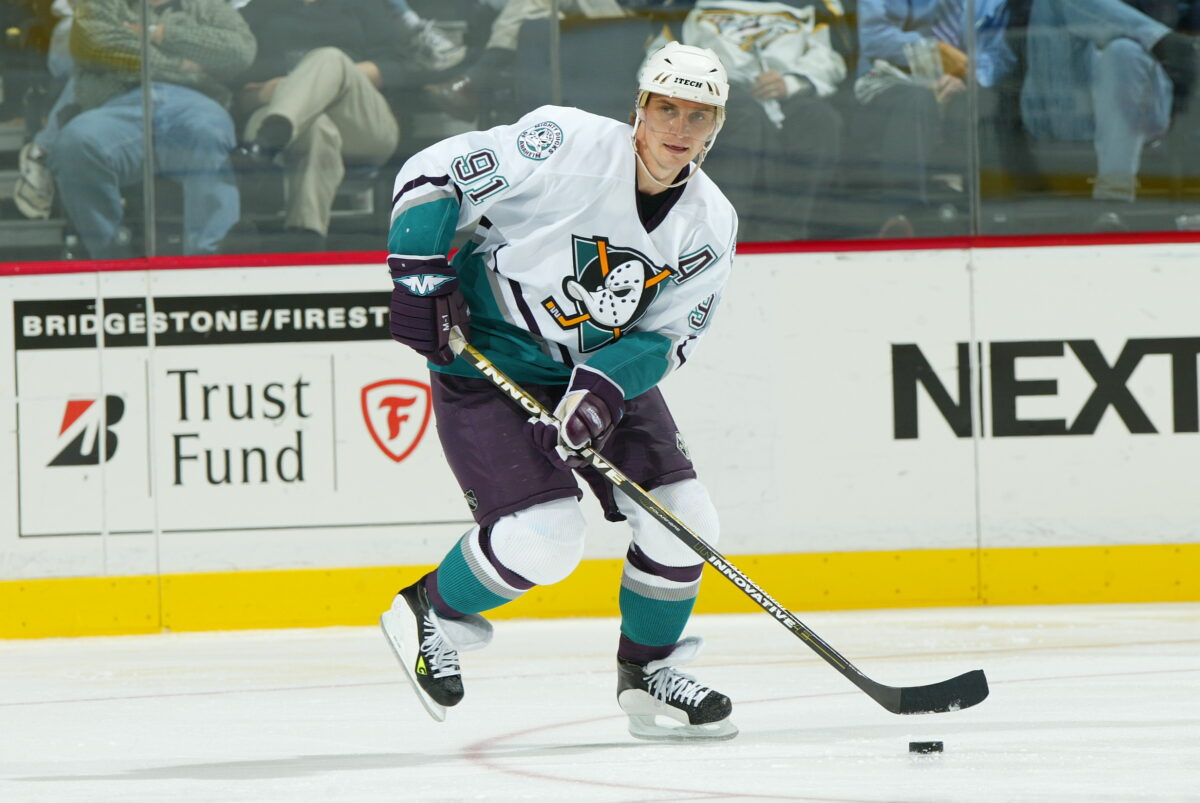The Anaheim Ducks recently dabbled in the 2023 unrestricted free agent market by inking two-time Stanley Cup champion Alex Killorn and grizzled veteran Radko Gudas to four- and three-year deals, respectively. The Ducks are a team in need of guys with big game experience, and both Killorn and Gudas stand to provide leadership intangibles and complementary play, if nothing else, to a young and evolving roster. Neither player is a sure thing though. While Killorn was a critical piece of the Tampa Bay Lightning’s incredible five-year run, and Gudas a gritty third-pairing defenseman for the surprising Florida Panthers this past season, both can accurately be described as question marks to replicate the success they had with their former teams. After all, both skaters are leaving lineups with dynamic skill from top to bottom, the same of which cannot be said about Anaheim.
Related: Meet the Anaheim Ducks’ 2023 Free Agency Additions
The Ducks, like every other team, have a history of both hits and misses in free agency. This offseason, I’ll publish a series that includes the franchise’s biggest free agent transactions and their careers in a Ducks uniform. Let’s start with Hall-of-Famer Sergei Fedorov, who was undoubtedly a miss by the Anaheim front office.
Fedorov Before Anaheim
The smooth-skating, slick-handed, and big-bodied Fedorov, part of the Detroit Red Wings’ Russian Five, had an illustrious Hall-of-Fame career before he even made it to Anaheim. In 13 seasons with the Red Wings, he eclipsed the 30-goal mark nine times, collected a Hart Memorial Trophy as the NHL’s Most Valuable Player, had four playoff seasons with 20 or more points (another with 19), and helped deliver three Stanley Cups. He was consistently hailed as one of the game’s best and most well-rounded players, which was elite company given he played at a time when players like Wayne Gretzky, Steve Yzerman, Brett Hull, and others were tearing up the league.
Fedorov Arrives in Anaheim
Fedorov decided to take his talents to Southern California after rejecting contract offers by the Red Wings following the 2002-03 season. At the time, Detroit’s loss was most definitely Anaheim’s gain. They were getting a version of Fedorov coming off an 83-point season and still on the fringes of his prime. Further, the Ducks needed to find a new face of the franchise following the gaping hole left by Paul Kariya’s unexpected departure. It seemed like an excellent match.

With a roster that looked markedly similar to the one that made a run at the Stanley Cup a season earlier, the Ducks failed to deliver on expectations with Fedorov leading the way. While he led the team in goals and points with 31 and 65, respectively, and stayed healthy, playing 80 games, the team finished with a modest record of 29-35-10-8 (this was back when the NHL still counted ties) and missed the playoffs.
The NHL lockout wiped out the 2004-05 season, and Fedorov played five games during the 2005-06 campaign before being traded in November 2005. After 85 games, his Ducks tenure was over, just like that. He did, however, eclipse the 1,000-point mark in a Ducks uniform, becoming the first Russian-born skater to do so.
Why Didn’t it Work Out?
The arrival of Fedorov coincided with both an influx of young talent to the roster like Joffrey Lupul, Chris Kunitz, and Andy McDonald, and the return of some heroes from their Stanley Cup Final run, including Rob Niedermayer, Petr Sykora, Steve Rucchin, and JS Giguere. Not to mention, highly-touted prospects Ryan Getzlaf and Corey Perry were drafted that same summer.
Despite losing Kariya, the team’s best player, adding a talent like Fedorov kept the expectations high in his first season. However, this combination of players just didn’t mesh, and the team was average in his lone full season with the team. Plus, the regression of players who delivered stellar performances that propelled the Ducks in their Cinderella season meant the Ducks were on the outside looking in. Injuries derailed the beginning of Fedorov’s second season, and GM Brian Burke was ready to head in a different direction (from ‘Ducks Send Fedorov to Columbus,’ Los Angeles Times, Nov. 16, 2005).
Out Went Fedorov, In Came Francois Beauchemin
Aside from having a remarkably short career in Anaheim, perhaps most memorable about Fedorov’s time with the team was his trade out of town, which brought in Francois Beauchemin from the Columbus Blue Jackets. He will go down as one of the Ducks’ most important players in franchise history, playing an instrumental role on the Ducks’ blue line from his arrival in November 2005 until his retirement in 2018. He played big minutes in all situations, played with tenacity and defensive awareness, and possessed a booming shot.
The swift removal of Fedorov from the Ducks lineup seemed like a blessing in disguise. A failed experiment in Anaheim in no way tarnishes his legacy, though; it just didn’t work out. That’s the business of free agency: you take calculated risks on guys. In the end, both sides fared well. The Ducks made it to the Western Conference Final that season and embarked on a 13-year run as a perennial Pacific Division powerhouse and bonafide Stanley Cup contender. Meanwhile, Fedorov concluded his Hall-of-Fame career by playing five more seasons in the NHL with the Blue Jackets and Washington Capitals, making appearances with the Capitals in the 2008 and 2009 Postseason alongside fellow countrymen Alexander Semin and Alex Ovechkin.
